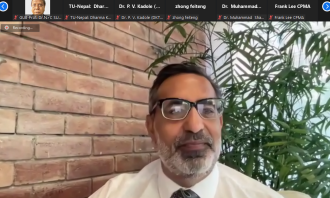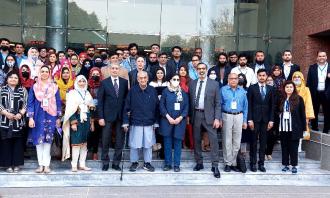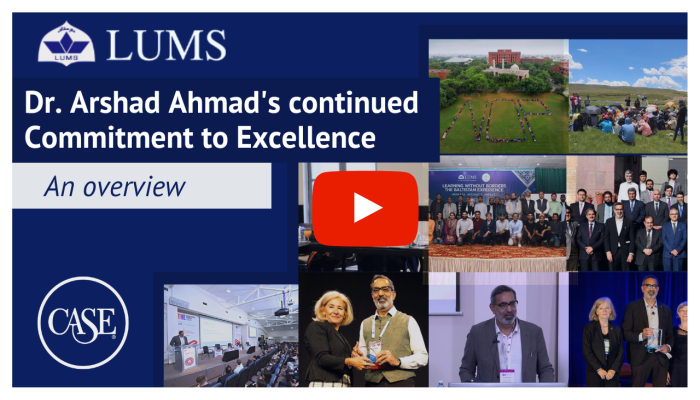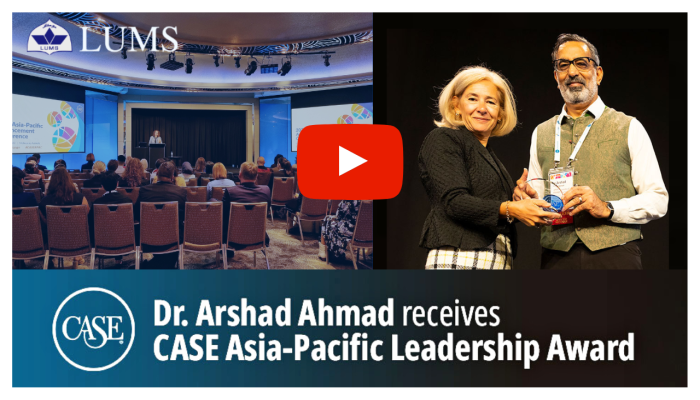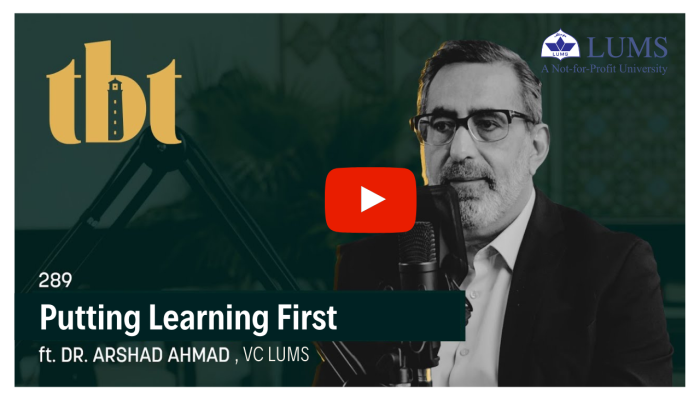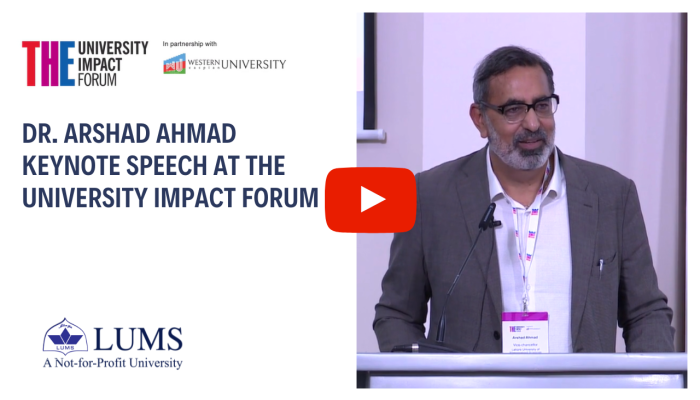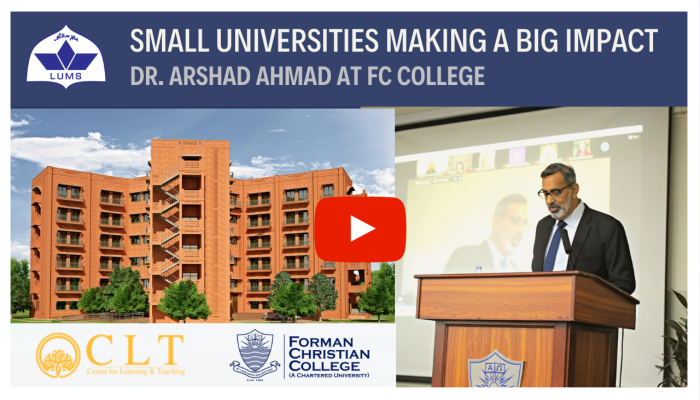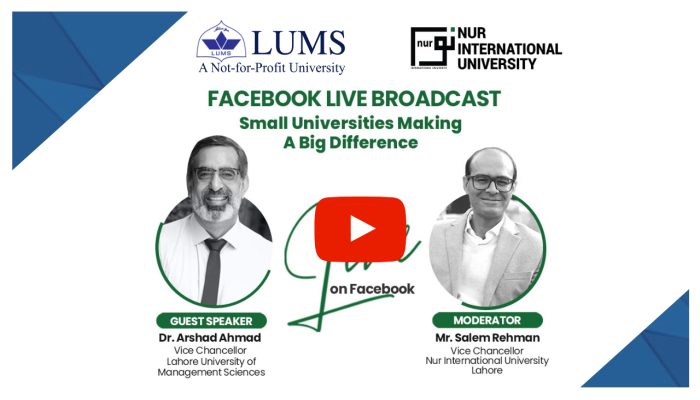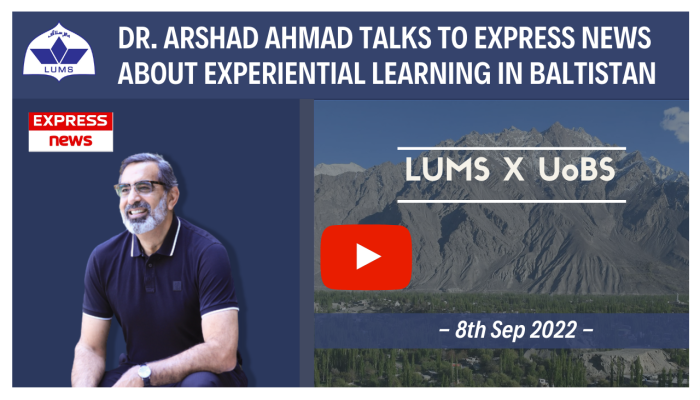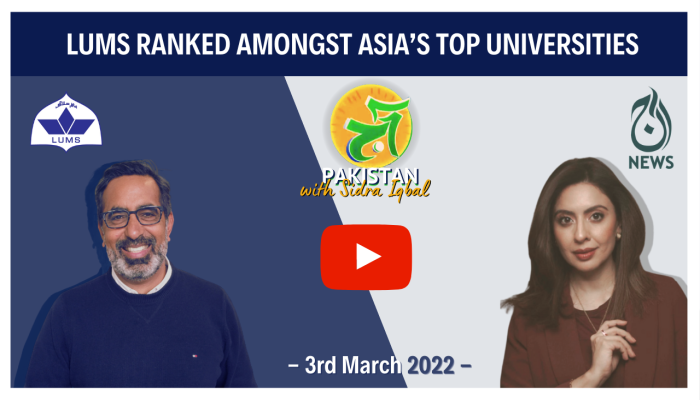Talks and Interviews
Keep up-to-date with Vice Chancellor Dr. Ali Cheema by reading his speeches and watching his latest interviews.
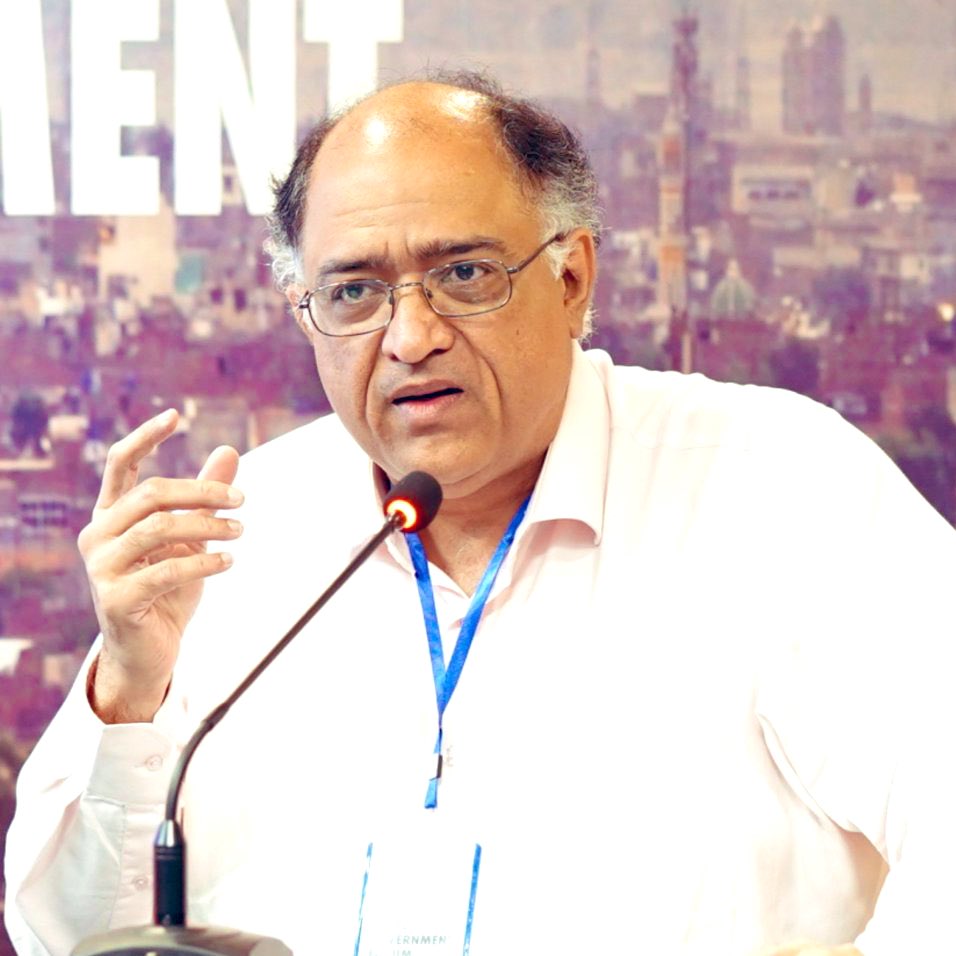
- SOE Practicum Conference 2022April 28, 2022SOE Practicum Conference 2022
Founding Pro-Chancellor, Syed Babar Ali, Dean, Dr. Faisal Bari, faculty, students, and distinguished guests, AoA
My apologies for not being there in person and I hope to see all of you soon. I’m so happy to be with you on this very special day. Thank you for inviting me.
You have been waiting a long time to come together in this Practicum Conference to celebrate your learning. So, in my remarks, I’d like us to focus on your learning.
I would like you to remember the people you met and the experiences that have shaped you.
Ask yourself: What have I learned that has become a part of me?
How have I changed? What did I do? And as a result, how do I think?
Here’s what Nobel Laureate Herbert Simon said about learning:
“Learning results from what the student does and thinks, and only from what the student does and thinks.”
So, when it comes to learning, Simon puts students first. When it comes to the type of learning, he puts doing first. And by reflecting on what we do, it changes our thinking.
The Practicum is the ultimate expression of doing and thinking which we call experiential learning. What you did and how you think will likely stay with you for a long time. And this is not by accident, but rather by design. A design that puts learning first. Putting learning first means a dramatic shift away from Pakistan’s dominant instructional paradigm that is teacher-focused. This means we need to enact a learner-centered paradigm, focused on what students do and think and learn. A paradigm espoused by this School of Education.
As you know, putting learning first requires thoughtfully designed, high-impact interventions that immerse learners in doing and thinking. And your practicum is that intervention.
Your teachers also play a critical role in putting learning first. It requires them to embrace new approaches to assessment and to provide you with ongoing guidance and feedback on your progress. The practicum is an applied exam that makes your work visible and changes a community. And this too is critical for supporting your learning.
Your teachers are modelling educational leadership in an education system that is rife with poorly designed assessment practices that value rote memorization at the expense of quality learning.
During your practicum, did you encounter an assessment that tested material that wasn’t taught?
How many students are trapped in the rituals of surface learning to please the teacher?
Or the strategic learner who can ace the exam but has little to show after?
These types of assessments can become the silent killers of learning.
But we know you have learned differently, here at SOE. You know the value of experiential learning and authentic assessments. And what it means to truly participate in shaping your own learning.
Reflecting on my own memorable learning experiences, even though I have always loved teaching, when I started, I knew very little about learning.
In 1992, I experienced an “aha” moment during a conversation with a colleague from Physics who asked me the following question, he said:
"You have been acknowledged with a national lifetime teaching award, so tell me, what is your favorite theory of learning? Maybe a theory or some framework can help me better teach physics."
I could not answer the question because I did not know a single theory of learning. I was dumbstruck. My thinking was bounded in a discipline. My teaching expertise focussed on what I did to teach, but learning theories, and connecting my discipline to physics seemed out of my reach. That sparked my curiosity to learn …. about learning.
I started reading about cognition, psychology, and other topics which naturally led me to explore the vast field of education. Next thing I know, after 15 years of teaching, I was back in school, to learn about learning.
Some of the many greats I read about in my PhD studies are probably familiar to you as well. Blooms taxonomy, Bigg’s constructive alignment, Kolb’s experiential learning cycle, the great John Dewey’s pragmatism and common sense for school reform, Paulo Freire’s work on social justice and critical pedagogy, and there were so many more.
But learning from these greats taught me a lesson. A lesson which Einstein summarized as “the more I learn, the more I realize how much I don’t know”. But I did feel more confident, and I found a deeper sense of my identity as an educator.
It was a series of experiences that introduced me to new concepts from a new discipline that resulted in opportunities to make new connections….Where learning seemed to have no borders. I started to read some of the top journals that were also exploring the boundaries of education such as The Journal of Financial Education, Art History Pedagogy, The Journal of Economics Education, Teaching Anthropology, Physics Education Research, and the Journal of Educational Psychology.
Education is really the nexus of all the disciplines. This is why it is so exciting to see that SOE students are offered electives that discuss the intersection of education with technology, with computation, economics, philosophy and psychology.
And it’s encouraging that SOE continues to increase its interdisciplinary focus to offer undergraduate minors in policy, politics, governance, and curriculum with multiple courses cross-listed with other schools and joint programs in the making.
Friends, what we may be really celebrating today is a unique and agile education program designed exactly for the purpose of breaking down disciplinary boundaries and learning without borders.
Completing a practicum prepares you for the future.
The founders of this school, from Dr. Bari and his predecessor, Dr. Andrabi, to Dr. Chugtai and the founding faculty Dr’s Tayyaba, Yasira, Gulab, and Qaisar – had this vision. Their work set the stage for the possibilities we see today to open SOE to all of LUMS and beyond. And as we thank and acknowledge our founders, and mark the celebration of your work, lets also look to the genius of Syed Babar Ali who realized the potential of SOE long before it was established.
You already know that Mr. Babar Ali is passionate about Education. That passion is matched by his vision for a no-borders School of Science and Engineering that was founded over a decade ago. It is a vision that has inspired LUMS Learning without Borders perspective that guides us today.
In an amazing 25-episode interview series with Mr. Babar, which I highly recommend watching, he revealed his favorite book and author to me in episode 19. The book is Gulistan, a landmark of Persian literature authored by the great poet Sa’di who had a huge impact on Mr. Babar and he said Sadi’s work changed his life.
Mr. Babar Ali’s inspiration taught him to always put learning first. And this is what he has done in doing everything he has, which is revealed in his autobiography “Learning From Others”. I urge you to read it.
Mr. Babar’s story is also revealed in a bigger narrative that he has curated over the past 35 years, which is the story of LUMS. That story uses our guiding perspective of Learning Without Borders to amplify diversity and access which make LUMS a mini-Pakistan.
For example, you will be proud to know that this year LUMS had applications from over 450 villages, towns and cities across Pakistan – from Gilgit Baltistan to KPK, from Punjab to Baluchistan and all corners of Sindh.
He also champions an excellence framework for research and teaching which, by design, now aims to unite the disciplines so that we can think collectively about the challenges we face in making a better Pakistan. But most of all, let’s remember purpose. According to Sir Babar Ali, the purpose of education is quite simple, and it is this:
“Make sure those who you work with end up better than you.”
In this journey, your journey at SOE, what have you unlearned?
So that you can relearn to make pathways for others who will be better than you?
What are the memorable lessons, or ‘aha’ moments that changed you?
Will you follow in your teachers’ footsteps?
Will you define a future where you make a unique difference through your learning and your leadership?
Let me also talk briefly about this conference.
When I look at some of the wonderful programs, I am struck by just how you have put learning first. Collectively, your expansive range of practicum experiences demonstrate the very best in active learning, co-operative learning, situated learning, and service-learning. Again, this is not an accident but by design resulting from many formative conversations and collaborations.
I want to congratulate the faculty practicum advisors, Dr. Faisal Bari, Dr. Mariam Chughtai, Dr. Gulab Khan and Dr. Qaiser Khan. I want you to join me in applauding them and Director Mehreen Noon as well as Associates Maydda Nabeel and Rukhsar Fatima.I also want to give a shout-out to three students, Sadaf, Arslan and Maham. These guys asked me for a 15- minute interview for their program evaluation on the LUMS pedagogical partnership program but instead we talked for 150 minutes. That’s a conversation I will remember. You can be sure that your work will impact Fatima, Dr. Launa, Dr. Tayyaba, and now Dr. Razia who are deeply involved in the partnership program. Did you imagine that?
The program also reveals so many other hidden treasures that will be celebrated today.
We will learn about Ms. Khalid’s project with the Pakistan Monitoring and Implementation Unit exploring ways to facilitate the learning of differently-abled students which takes inclusive education to another level.
I’m also inspired by Ms. Jannat Karim and Ms. Hina who were paired with the ITA or 'Idaara-e-taaleem-o-agaahi'. They worked with six schools in the slum areas of Lahore on ‘life-skills’ required to survive for a better life on the street.
If we are lucky, maybe Mr. Muhammad Ali Zafar will perform for us today. He has made his mission to improve the lives of struggling musicians, especially during Covid-19. His practicum, like some others, is entrepreneurial. He hosts his educational program on an app which improves ear training, sight reading and music theory. Wow!
Congratulations to Sehrish, Maydda, Fatima and Mohammad who founded Parwaaz e Umeed—a social welfare project where digital platforms were used to educate children of LUMS janitorial staff.
Congratulations to Abdullah, Sumaya and Farwa for founding Tabbir, Jugnu and One Earth Toys.
Through your Practicum, you are fortunate to have been paired with excellent institutions making a real difference in people’s lives.
SOE has created so amazing affiliations with organizations like The Citizens Foundation, Akhuwat, Knowledge Platform, SABAQ, TEVTA, and many more
You are all planting the seeds for a forest of learning and a lifetime of education.
Students, you must continue to build better partnerships, better friendships, better communities, and a better world.
50 years ago, Pakistan joined other countries in becoming a signatory to the United Nations’ covenant that recognizes education as a human right. However, rights require action. How do critical measures of societal well-being including nutrition, sanitation, numeracy, and literacy, supersede Pakistan’s educational reform agenda? Could a learning-focused system that attends to these priorities, enable the country to become a better steward of its 50 million students, almost 2 million teachers, and over 20 million children who are not in school? We know education is the greatest equalizer and the most powerful engine for Pakistan’s economic development and societal well-being.
The lesson from the pandemic and from the disruptions before us are an invitation for all to learn how to learn, to unlearn, and to relearn.
As a society, we must put learning first.
Thank you!
- Hubei- South Asia Conference 2022April 1, 2022Hubei- South Asia Conference 2022
Deputy Director-General Yu Xuemin, Party Secretary, He Weijun, President Wang Yanting, Vice President Huang Yingping, Vice Chancellors, and distinguished colleagues, Da Jia Hao, and greetings to everyone!
On behalf of LUMS university, thank you for organizing this Conference to increase cooperation and collaborative exchange between universities in Hubei and South Asia. As partners in China’s Belt and Road Initiative in Pakistan, we look to China’s Double First-Class University Plan to provide inspiration to create and develop world-class universities and disciplines here.
We recognize Chinese advancements and successes in space, quantum technologies, and cutting-edge chemistry that underline its superpower status in research. In our case, China has been a good teacher.
It is said that a disciple of Kǒng Fūzǐ (or Confucius) once asked the great educator and philosopher the following question:
“Is there any one word that could guide a person throughout life?"
The Master replied:
"How about 'reciprocity'! Never impose on others what you would not choose for yourself”.
Similarly, in this President’s forum, we were never told to follow the Chinese Plan, but instead, it is expected we offer our own vision so that we can become true partners and share in our mutual successes.
So what is our vision?
Simply stated, for the first 35 years, the vision was to become one of the top universities in Pakistan. Having achieved that, for the next 35 years we aim to become a top university in South Asia. With this vision, we know in our hearts that China wants us to succeed, because strong neighbors are essential for mutual and reciprocal success.
But today, the challenge for Pakistan, like many other developing countries, is existential. With a population of 220 million people, a GDP per capita of about $1,200, and low enrolment rates, access to and quality of education is a big challenge in Pakistan.The visionary H.G. Wells once described this challenge facing us today as: “more and more a race between education and catastrophe”. Despite the difficult circumstances, we are convinced that we will win this race. So, allow me to share a few details about LUMS University here in Lahore.
Our 100-acre campus is located in the suburbs with all modern learning, sports, and living facilities. The campus is known to be a home for all 104 variety of trees that you can find in the province of Punjab including the amazing Amaltas tree, known for its healing properties. We are also home to 10,000 migratory birds that come to live with us and contribute to the ecology of the campus.
Looking at LUMS at a glance, we have about 5,000 students, half of whom live on campus, with 42 academic programs, 1,400 recruiting partners, and over 300 faculty with PhDs from the most prestigious universities around the world.
This holistic ecosystem stands on our longstanding values which is a source of pride and success. This is because everything we have done at LUMS is based on merit, increasing diversity, and on striving for excellence.
Our university’s philosophy is “Learning Without Borders” with the objective to break academic, geographic, gender, and socio-economic barriers.As a private not-for-profit university, one out of three students at our institution receive generous financial support. 21 years ago, we established our signature National Outreach Program. Our outreach students comprise over 10% of our annual intake. Each year we search for talented students in high schools from over 138 villages, towns, districts, and cities across Pakistan. These students come from disadvantaged households of large families with an average monthly income of Rs 37,000, or about 1,300 Yuan.
At LUMS, all students must meet merit criteria to be admitted. There are no quotas, nor do we offer any preferential treatment. If admitted, we offer full support for tuition, boarding, food, books and living expenses. Over 1,300 students have benefited from this program. And the results over twenty years have been transformational.
We are very proud to have received The Global Platinum Award for Best Practices in Diversity, Equity and Inclusion by the Council for the Advancement of Studies in Education, a Washington based NGO.
Many of these NOP students go on to attend top universities worldwide to pursue graduate education, and some lead top organizations worldwide. Last year, out of 14,370 students who wrote the prestigious National Civil Service Exam, the top three students were from LUMS, and the 1st position was secured by an NOP student. Striving for excellence is our quest.Since we last met in Hubei on October 17 in 2018, our Schools continue to elevate LUMS reputation globally. For example, The Suleman Dawood School of business at LUMS is the only School in Pakistan to receive AACSB accreditation in 2019 – a distinction awarded to less than 5% of business schools worldwide.
Here, The China–Pakistan Economic Corridor, or CPEC opens the door to what we are calling the “China Pakistan Management Initiative”. We organized a conference where academics, policymakers, and practitioners explored CPEC and focussed on bureaucratic and cultural issues that can be a barrier for cross-border business.
Similarly, our Law School is home to Pakistan’s first Centre for Chinese Legal Studies in Pakistan which has collaborated with the University of Wuhan by offering several courses in Chinese law, and hosting conferences, symposia, and training. Today the Centre is holding an International Virtual Conference focussing on regional integration, economic interdependence, and linguistic diversity, which will be highlighted.
Our School of Science and Engineering has set a global agenda by focusing on big data, quantum computing, AI, biogenetics, and the life sciences. It has also been actively collaborating with Chinese counterparts. Here, our fastest growing department of Computer Science and the Energy Institute signed an MoU in August 2019 with Songuo Motors on Electric Vehicle research and development. Under this collaboration, a new venture in swappable battery-based electric vehicles has been launched involving two and three-wheelers in the Pakistani market. The Energy Institute has released several Market Assessment reports that have since been adopted as government policy to create more climate-friendly solutions for Pakistan
These milestones partly explain why last year, LUMS was ranked by Times Higher Education as the 40th best small university in the world. For young universities like ours celebrating its 35th anniversary, Pakistan’s partnership with China is unparalleled among inter-state relations. Unwavering mutual support, trust, and respect are woven into the history of our unique friendship which we wish to strengthen.
While we do offer over 50 unique international exchange programs, few students from China know about LUMS. We wish to strengthen our ties regionally and attract more Chinese students to LUMS. The pandemic has made it clear that educational solutions must come through collaboration and through multidisciplinary expertise. Universities like ours are positioned to become more relevant and contribute more meaningfully to improve the human condition.
Colleagues, I hope my thoughts and ideas will resonate with you and encourage collaboration amongst this group. We can harmonize our core values that will enhance trust, mutual respect, inclusiveness, and a love for learning.
Thank you!
- Cryosphere & Society Meeting 2022March 29, 2022Cryosphere & Society Meeting 2022
AoA and greetings everyone
Unfortunately, I missed the opening yesterday, but I understand your interactions have been very productive. They underscore the important work that is taking place through collaborative networks involving ICIMOD and HUC.
As a non-expert in the field of the cryosphere, my views are likely quite naïve.
However, I echo the growing concern of receding glaciers which we learned about first-hand on a recent trip to Skardu, and the accelerated warming of the Himalayan region, which I believe has the largest concentration of frozen water on earth following the two hemispheric poles.
The 3rd pole isn’t mentioned in Wikipedia when one references cryosphere. But the reported data is staggering when it comes to protecting livelihoods and preventing disasters in this region.
Few people know that over 200 million people live in the Himalayan region and about 2 billion people rely on the rivers that flow from this mountainous area.
Freshwater from the cryosphere is essential to sustain us, and as Dr. Abu-Bakr reminds us, water-related issues are one of the most important challenges facing our planet and humanity.
Just as the world thinks of the Amazon when it comes to forests, we must consider the 3rd pole when it comes to the cryosphere.
In this context, considering that the cryosphere is integral to any understanding of climate change, your work represents a feedback system that informs us of critical interventions that are required.
And just as we know that feedback is critical to learning, one might ask: what can a small university like ours do to strengthen our collaboration? Well, the answer must be “A LOT”! Or, at least, as much as is possible and reflected in institutional priorities.
Let me highlight 3 such priorities that speak to our efforts.
First, what is the best way forward to strengthen partnerships under the umbrella of ICIMOD and HUC? For example, should our role lean towards securing primary data with a few countries like the UK and Canada that would be forged through strengthening local partnerships with northern universities in Pakistan?Secondly, what do we really mean by local partnerships beyond signing MOU’s? For example, our growing partnership with the University of Baltistan has resulted in our respective teams co-designing and co-teaching 5 courses. These courses will be offered to 300 students in Skardu this coming July, with half of those students coming from each institution. Three of the 5 courses will focus on hydrology, energy, and life sciences. What is unique about these courses is that they are primarily field-based, involving real-time data collection from local communities. This data will feed research questions addressing an evolving curriculum that has a direct impact on local communities.
This takes me to our third priority, which is the need to conduct our research and teaching through the lens of interdisciplinary, multidisciplinary, and transdisciplinary work. This is why our Centre for Water Informatics and Technology is building expertise from the pure, natural, and social sciences, as well as additional insights gleaned from our professional schools.
This is the way forward for all of our 6 centres and will be located in a landmark Central Building on this campus the design of which has been completed.
The aim is to generate use-inspired research that bridges gaps between theory and applied practice and through curricula that connect to local communities. All of this fits very well into our university’s perspective and philosophy of “Learning Without Borders”.
To conclude, it is important to reiterate our commitment to institutional and network collaboration, to transdisciplinary approaches, and to interventions that will make a difference in the lives of those who are on the front lines of disruptive climate change.
I also take this opportunity to sincerely thank the multiple faculty, students, and staff who have taken the time to come from Gilgit and Skardu; to our colleagues from Lahore, Peshawar, and from WAPDA, Pakistan Meteorological Department, and Pakistan Agricultural Research Council.
And finally, I know we have a strong presence from Royal University of Bhutan, the University of Central Asia, some NGOs including the Hasho Foundation, and last but not least, from our friends at ICIMOD, the University of Bristol, and the University of Manitoba where I believe you are still enjoying some snow.
Thank you everyone
- Launch of the CIMPA Research School at LUMSFebruary 28, 2022Launch of the CIMPA Research School at LUMS
As-salamu alaykum and welcome everyone!
Thank you for this opportunity to be here with you today to launch the CIMPA Research School. Organizing research programs in developing countries, building bridges between disciplines, and fostering mathematics research in disadvantaged areas is the foundation of CIMPA’s work and the focus of each CIMPA school. This is precisely why I’m thrilled that LUMS is co-hosting such a significant event.
This event marks a key milestone for LUMS by enhancing our reputation for research and innovation in mathematics. Also, your efforts are helping to strengthen LUMS Learning Without Borders perspective on research and teaching. Here, we strive to break academic, geographic, gender, and socio-economical barriers to innovate and serve the wider community.
Learning Without Borders also elevates our goal to internationalize despite historical barriers and intractible constraints that have prevented cross-border ties and visitors to Pakistan. To use a metaphor of cutting the “Gordian Knot”, this lecture series does just that by finding new approaches to strengthen ties beyond our borders.
It is in this spirit that CIMPA and the International Mathematical Union have chosen LUMS to host this extensive two-week lecture series to bring together prominent mathematicians and thinkers from overseas to learn about newly evolving areas of research in mathematics.
A big thank-you to Dr. Imran Anwar, Chair of the LUMS Mathematics department, who has been providing critical leadership to his colleagues and key math programs at LUMS and beyond. And my appreciation also goes to Professor Jorge Mozo Fernandez for joining us from Spain.
I’m proud to acknowledge the LUMS mathematics faculty who continue to be a part of such innovative initiatives locally and internationally. And to our guests who have traveled to be here, thank you so much for participating to promote research in Mathematics and making this a very special series.Finally, thank you Dean Sabieh Anwar for encouraging our faculty and giving this event the attention it deserves.
Dear colleagues, I am delighted we will be the home to this important event that is sure to have far-reaching benefits for mathematics research and break barriers to innovate and serve the wider community.
I wish you all the best for your event and in your ongoing collaborations.
Thank you!
- In-Person Convocation 2021January 16, 2022In-Person Convocation 2021
Honourable Pro Chancellor Razak Dawood Sb, Founding Pro Chancellor, Syed Babar Ali Sb and;
our keynote speaker Mr. Shahid Abdulla; esteemed members of the Board of Trustees, our distinguished faculty and staff;
proud parents, family, and friends; And our remarkable graduating Class of 2021!
Assalamualaikum and good afternoon. I am delighted to welcome you today to celebrate your graduation. Making it to the finish line, to graduate is no easy task. It demands hard work and discipline. And you rose to the challenge.
You coped with uncertainty, you showed unwavering resilience. We are thrilled to share this special day with you to celebrate this important rite of passage together.
To the parents and family members, in so many ways, you have made sacrifices in support of today’s graduates. And so, this day also belongs to you.
Ladies and gentlemen, join me to congratulate and applaud our graduates and thank their families
Class of 2021, we are very proud of you!You took on more responsibilities and learned in new ways.
You turned each obstacle into an opportunity, and you finished strong! As you reminisce and rejoice with friends and family today, and when you leave campus today, I ask you to think deeply about one word. That word embodies a distinctive attribute, and a degree of excellence. That word will define you, and the education you’ve received. That word is quality.
For us, quality appeared the moment you joined LUMS. You met the highest standards of merit and brought diversity we are so proud of. For us, everything we do focuses on a quality education, whether on campus or online. But what does quality really mean? How does a university ensure the highest quality standards? And how do we begin to see and feel that quality?
I believe that quality is associated with certain habits and certain values that define LUMS. Our academic programs, our faculty who engage you in their research and teach you, push you to work hard and to persist until the job gets done.
However, you must be the driver of your learning. This is because, as Nobel Laureate Herbert Simon once famously said “Learning results from only what the student does and what the student thinks”. That result is what you do, will be derived from habits to work hard, to persevere and to find intrinsic motivation. These habits will last longer than any specific knowledge you acquire. These habits are also valued by every employer, more than any skill you possess at this point in time. More importantly, these habits are crucial to build a better Pakistan.Your LUMS education also provided foundational values. Specifically, values that personify integrity, humility and empathy that you have taken with you into the wider world. These values determine who you are, and how you will live and work with others for the rest of your life. It is through these habits and values in your actions that quality education becomes visible – not just within our LUMS community, but out in the world.
Let’s be very clear however – quality education neither begins nor ends with graduation.
Graduates, quality shines not only through the knowledge you pursue, but also in the company you keep, in the ways you help others, and in the character you build. On this path, you have a great head start, having already repeatedly exemplified quality in your actions throughout this pandemic. Graduates, we are privileged to watch you courageously advocate for those less fortunate than you and your support for each other. Allow me to share a handful of examples.
Take the two young women from the Gurmani School – one who launched ‘The Mirror’ – supporting women’s rights which received the national ‘25 Under 25’ award presented by the Embassy of the Kingdom of Netherlands, and another, who provided relief packages and raised over 100,000 Rupees for the transgender community.
We look at another young woman from the Suleman Dawood School of business, who was on Dean’s Honor List consecutively for the last 3 years and president of the LUMS Entrepreneurial Society with her start-up called Tajarba that has enabled hundreds of students to gain internships.
We also applaud a group of young men from the Syed Babar Ali School of Science and Engineering who started Madadgaar, a platform that connects COVID-19 patients to recovered plasma donors.
And we are inspired by another group of MPhil students from the School of Education who started Parwaaz – a Youtube channel containing educational activities for young children of our custodial staff.
It is in this spirit, students from the Sheikh Ahmad Hassan School of Law decided to serve the underprivileged communities of Gilgit-Baltistan through social outreach programs to bring societal change through accessible education and social justice.There are many more examples where you demonstrated quality of the highest order, and for that, you deserve to be proud.As you move forward, I encourage you consider a few additional thoughts about quality education. First, quality goes hand in hand with purpose. Having embraced many challenges at LUMS, you must now actively seek out challenges. Most of us who graduated a long time ago had very little idea of our life’s purpose. Most will also tell you that finding your life’s purpose takes a lot of time. And while this is true, purpose can also be found in almost anything you choose to do today. For example, if you find that certain types of work bring you joy, you are finding your purpose. Or when you find you are so engaged in getting something done that you lose track of time, then you have will have found purpose. Purpose is the gift that propels you forward. Purpose improves the quality of what you set out to do.
Secondly, when we think about our work as service, we must also think about its impact. Service is often enacted by showing our best to our superiors so we can be like them or better than them. Our thinking here “to serve” is derived from the word subservience to our superiors, to whom we try and prove ourselves.
However, if you think of service as giving, and to help others, you can flip conventional wisdom and serve those below you, so they become better than you. By lifting others we build better partners, better friendships, better communities and a better world. Service binds us together as a learning community and as a nation. It is the highest order of quality.
So, I leave you to further consider your purpose and your service
And what impact is it having? My friends, you have joined a world today that faces myriad challenges. The COVID pandemic may become an endemic but it continues to disrupt us. The air we breathe, the lands we roam, and the water we drink are degrading before us. Compound that with poverty, inequality, and our faltering systems of governance; the challenges appear to be enormous. But there are those who give us hope and give us faith. That hope and faith lies in all of you because you uphold quality habits and values and because you will find your life’s purpose. What defines you are the next steps you take. And we believe in your next steps.
The late novelist Toni Morrison gave us wisdom we can all live by.
She said and I quote:
"I tell my students, 'When you get these jobs that you have been so brilliantly trained for, just remember that your real job is that if you are free, then you need to free somebody else. If you have some power, then your job is to empower somebody else,'"
I have no doubt that you, the Class-of-2021 will do just that.
You will teach others to outshine you. And whatever you imagine, will become real. Graduates, you have the qualities the world needs. You now have the tools and you’ve always had the ambition. So, choose to focus on the goals you care most about and causes that give you purpose. And keep on learning.Class of 2021, we offer our sincere congratulations to you.
As you change, you will change the future of our nation and the world.
We are so very proud of you, and we can’t wait to see what you do next.
Thank you!
- In-Person Convocation 2020January 15, 2022In-Person Convocation 2020
Honourable Pro Chancellor Razak Dawood Sb, Founding Pro Chancellor, Syed Babar Ali Sb and; our keynote speaker Dr. Arfa Sayeda Zehra; esteemed members of the Board of Trustees; proud parents, family, and friends; and our remarkable graduating Class of 2020!
Assalamualaikum and good afternoon.
I am delighted to welcome you today to celebrate this milestone in your life. Making it to this point – to graduation– is no easy task. It has demanded hard work and discipline. You were pushed outside of your comfort zone, and had your assumptions challenged. You rose to the challenge. You coped with great uncertainty and showed unwavering resilience.
For you, the Class of 2020, the road to Convocation, a time-honoured tradition, has been longer than usual. You succeeded. As faculty and staff, we are thrilled to share this special day with you. We have eagerly anticipated your return to campus and being able to celebrate this important rite of passage together.To the parents and family members with us today – you know first-hand that the journey has been long. In so many ways, you have made sacrifices in support of today’s graduates.
And so, this day also belongs to you.
Ladies and gentlemen, please join me to congratulate and applaud our graduates and thank their families.
Class of 2020, we are very proud of you!
You have been through so much – perhaps more than any LUMS cohort.
The global pandemic forced you to take on more responsibilities, learn in new ways, and forge new connections. You turned each obstacle into an opportunity. You finished strong!
Many of you are already employed and you are truly fortunate. Hold onto this fortune. For those of you who are still considering your options, hold onto your strength of purpose. When you leave campus today, I encourage you to spend time thinking about the idea of quality, specifically when it comes to who you are and the education you’ve received.
Quality was defined the moment you were admitted to LUMS. You met the highest standards of merit and contributed to the diversity that we are so proud of.
At LUMS, our goal is to provide all students with quality education, whether on campus or online. But what does quality really mean? How does a university provide you with an education that meets the highest quality standards? And how do we begin to see and feel that quality?
At LUMS, quality derives from very specific habits and values. The learning experience at LUMS provides opportunities to develop and nurture essential, lifelong habits - including hard work, drive, and perseverance. These habits will serve you longer than any specific knowledge or skills you acquire. Such habits are valued by every employer; more important, they are crucial to society and the world. Your LUMS education also provided foundational values that you are taking with you into the wider world – values like merit, integrity, and empathy. These values now shape who you are and how you will live and work with others for the rest of your life. It is through these habits and values in the actions of our graduates, faculty and staff that quality education becomes visible – not just within our LUMS community, but out in the world.
Let’s be very clear however – quality education neither begins nor ends with graduation.
Your experience at LUMS was a journey of learning that inspired you to question more, to listen more, to read more, and to write more.
Sadly, many of us lose sight of the importance of these essential habits when visual media and texting minimize their critical importance both to our personal development and to society. Questioning, listening, reading, and writing aren’t old-fashioned habits, they are critical for the 21st century. They open the world of ideas, change our perspective, and strengthen our beliefs. They humanize us. They help us to become more creative, more empathetic, and better communicators. They make us better colleagues. Better leaders.
Better partners and family members. Better friends. Better community members. And better human beings.Graduates, and members of the LUMS community, I urge you to prioritize quality not only in the knowledge you pursue, but also in the company you keep, in the many ways you give back, and in the character you build. On this path, you have a great head start, having already repeatedly exemplified quality in your actions throughout this pandemic. Take for example a group of MPhil students from the School of Education who started Parwaaz – a YouTube channel containing educational activities for young children of our custodial staff. Or Riayat, a student run organization that led a major ration drive to support the most vulnerable in our society. Or, Madadgaar a platform that connects COVID-19 patients to recovered plasma donors. This was developed by students from the School of Science and Engineering. Graduates, it has been a privilege to watch you courageously advocate for and support each another.
We admire you. You demonstrated quality of the highest order, and for that, you deserve to be proud.As you move forward, my advice to you is two-fold. First, we all derive quality from discovering and nurturing purpose. Having embraced many challenges at LUMS, you must now actively seek out challenges. When you find yourself driven by work that brings you joy; when you are so engaged that time flies, then you will have found purpose.
Purpose is the gift that propels you forward.
Secondly, as you assume more responsibility and leadership, I’d advise you to continue to focus on service and its impact.
Serving others means giving back so they become better than you. Service binds us together as a learning community, as a nation, and as a world. It is the highest order of quality. So, how can you give back? And what impact will it have?My friends, the world today faces myriad challenges:
COVID-19 rages on. Mental health struggles have been exacerbated by the pandemic. Climate change degrades the air we breathe, the lands we roam, and the water we drink. Poverty, inequality, and people losing faith in our systems of governance. The challenges we face are truly enormous.But we have faith and there are many reasons for hope. That faith and those reasons are found ultimately in people like you who uphold high quality habits and values as you move forward. The writer Pearl S. Buck once said, “The young do not know enough to be prudent, and therefore they attempt the impossible – and achieve it, generation after generation.”
I have no doubt that you, the Class-of-2020 will do just that: achieve the impossible.
At LUMS, you’ve Learned Without Borders – across disciplines and social status, gender and geography.
Graduates, you have the qualities the world needs. You now have the tools and you’ve always had the ambition.
So, choose to focus on the goals you care most about and causes that give you purpose. And keep learning.Class of 2020, we congratulate you.
As you change, you will change the future of our nation and the world.
We are so very proud of you, and we can’t wait to see what you do next.
What defines you are the next steps you take. And we believe in your next steps.
Thank you!
- SAHSOL Dean's Honor List CeremonyDecember 4, 2021SAHSOL Dean's Honor List Ceremony
Rector Shahid Sb, provosts Dr. Farhat and Dr. Jadoon, Dean Aziz, faculty, parents, and our meritorious students, Assalaam o Alaikum.
The Sheikh Ahmad Hassan School of Law is the voice of progressive education in Pakistan. Its outstanding faculty, staff and students are passionate advocates for justice which is not only a human virtue but the reason why nations flourish.
On this very special day we congratulate and applaud our students who have achieved distinction and achievement. You worked hard. You persevered through the pandemic. You never gave up and you never looked back.
Today is also very special for your parents, without whom we would not be here today. Please join me to also applaud our parents and family here who have been with you throughout your journey.
Despite the challenges and adversity, you have faced, we are here today to show the world how you thrive academically and beyond.
Take for example Eman Haider from Kashmir whose world collapsed following the earthquake in Muzaffarabad. Eman lived in makeshift tents while reconstructing their home and deeply understands why we must serve the disadvantaged.
The same is true of Karim Ahmad from Hunza whose family is deeply engaged in serving the underprivileged communities of Gilgit-Baltistan. Both are leading Social Outreach Programs to bring societal change through accessible education and social justice.
Then there is Zulaikha Adnan, who was the first person to come to LUMS from an Islamic college in Karachi and has achieved a perfect GPA of 4.0 for 2 consecutive semesters. Beyond academics, Zulaikha is very active in the Student Council and exemplifies what many of her peers who are serving leadership positions in school governance and our student societies at LUMS.
These are some of the many examples of holistic learning SAHSOL students exemplify. This is why we look to your leadership to break boundaries – imaginary and real boundaries that suppress our potential and our sense of natural justice. And this is why we must collectively champion learning without borders, which LUMS stands for.
Today, through your accomplishments we see that education is a gift. It is a precious gift that has lifted you. And now, it is your turn to pass this gift on to others and lift them.
As role models you are expected to make greater contributions to society, because success is a two-way street. Success also comes with greater responsibility. And the greatest responsibility you have, is to help others to become better than you.
Congratulations, and best of luck to all of you.
Thank you
- Gurmani School Dean's Honor List CeremonyDecember 4, 2021Gurmani School Dean's Honor List Ceremony
Rector Shahid Sb, provosts Dr. Farhat and Dr. Jadoon, Dean Khan, faculty, parents, and our meritorious students, Assalaam o Alaikum.
The Gurmani School is our largest school. Its outstanding faculty, staff and students are the voice of progressive education in Pakistan. The Academic block – the hub for Gurmani is also the heartbeat of LUMS.
Today we congratulate our students who have achieved distinction and achievement. You worked hard. You persevered through the pandemic. You never gave up and you never looked back.
This makes today very special for you. It is also very special for your parents, without whom we would not be here today. Please join me to also applaud our parents and family here who have been with you throughout your journey.
Despite the challenges and adversity you have faced, we are here today to show the world how we thrive academically and beyond. Let me be specific.
Take for example, Muhammad Sarim Gillani. Sarim has been on scholarships throughout his schooling, including LUMS, where he is on a merit scholarship maintaining a 4.0 GPA. Somehow, Sarim also finds time to participates in 15 student societies where he holds several leadership positions.
Then there is Faryal Ashfaq who launched ‘The Mirror’ – a not-for-profit supporting women’s rights. For her efforts, Faryal received the national ‘25 Under 25’ award presented by the Embassy of the Kingdom of Netherlands and won a grant of $10,000 to implement an educational curriculum in schools across 10 cities of Pakistan.
And Shajeea Khalid is with us. She is the President of the LUMS Feminist Society and has been teaching young children about consent and inclusivity. During the pandemic, she provided relief packages and raised over 100,000 Rupees for the transgender community.
These are some of the many examples of holistic learning Gurmani students exemplify. And this is why we look to your leadership to break boundaries – imaginary and real boundaries that suppress our potential. And instead, champion learning without borders, which LUMS stands for.Today, through your accomplishments we see that education is a gift. It is a precious gift that has lifted you. And now, it is your turn to pass this gift on to others and lift them.
As role models you are expected to make greater contributions to society, because success is a two-way street. Success also comes with greater responsibility. And the greatest responsibility you have, is to help others to become better than you.
Congratulations, and best of luck to all of you.Thank you

